The "Bakalar" Notebook
By Stephanie Rogstad
Grandma Mary could cook. She could take anything in the kitchen and whip it into a great meal. A little bit of this and a little bit of that (she never measured anything) and we would have a delicious meal. Vegetables came from the garden, vino came from Grandpa Nick’s dirt floored wine cellar (there’s another story), chicken came from the coup (not the grocery store), and she made her own bread. But bakalar was a mystery to us grandkids. We knew it was a fish dish, it was for special occasions, and we rarely saw Grandma Mary make it. We loved the fish and potato mixture, oozing with olive oil and garlic with a hint of black pepper.
In 1985 my cousin, Jeff, and I decided we had better witness the making of this mystery. So we sat down in “Gramma’s” kitchen one day, paper and pen in hand, along with a few pivos. The first page of the Bakalar Notebook had begun. We took copious notes.
Gramma had all the ingredients gathered on the kitchen counter: dried salt cod, russet potatoes, olive oil, garlic and black pepper. She started by soaking the cod in cold water for 3 hours. During the preparation, she recalled how, long ago, the salt cod could only be had in dried, salted slabs of the fish. The soaking took many more hours, if not days, to reconstitute the fish. Now the salt cod is nicely de-boned, filleted, and salted, sold in wooden boxes from Nova Scotia at $13.00 a box!
Towards the last hour of soaking, Gramma cooked the potatoes. She was careful to steam them, not boil them. When the spuds gave way to a plunging fork, they were removed from the heat and cooled. After the fish had soaked for 3 hours, Gramma put it in a pot of cold water and brought it to boil over medium heat. The fish cooked for at least 30 minutes, or until it flaked easily. The smell of the cooked cod was distinctive and lingered in the kitchen for days.
Now the smell of bakalar simmering on the stovetop had varying effects on people and relationships in our family. Almost all of our family members loved it. But when all of us cousins started having yearly bakalar sessions, cousin Jeff’s wife would NOT let us cook the stuff in her kitchen. We were banished to the garage! So there we were, with the Coleman camp stove, simmering salt cod, peeling potatoes, and having the party in the garage while his wife sulked in the house. Needless to say, that relationship didn’t last too long.
Back to the recipe! When the potatoes were done and cooled, Gramma peeled them, cut them into cubes and put them in a big bowl. When the cod was cooked and cooled, she took the slippery fillets in her hands and smushed them until the pieces were small and fine. She then peeled and finely chopped 3 ½ HEADS of garlic and added them to the mixture. Then came the olive oil. No fancy EVOO for this recipe. It had to be the plain, ol’ olive oil, about 1 ½ cups. After this was poured over everything, she mixed it with her hands while Jeff and I took turns sprinkling ground black pepper from a little can until Gramma told us to stop. After a few tastings, she covered the bowl, and let it sit for a few hours to let the flavors meld. And if enough of it lasted over a few days, the stronger the flavors. It oozed out of our skin.
Bakalar became an important social event in the lives of my family. It brought aunts, uncles and cousins together at least once a year for many years. My brother, John, started the Bakalar Notebook to document each gathering, including the original write up in 1985. There were times when we wanted, or had, to experiment with the ingredients. His notes were detailed, such as:
Fresh cod is banned! One year, we couldn’t find any salt cod, so we tried fresh cod filets. They were too soft and not nearly salty enough.
We tried using extra-virgin olive oil. It was too light and did not stand up to the cod or garlic.
Use only black pepper from the can. Fresh ground pepper? HA! Again, the flavor was just not the same as the stuff from the little can.
Traditional methods and ingredients only. But we experimented in other ways. We learned to enhance the olive oil. We chopped the garlic early in the process, and let it marinate in the olive oil while everything else was being prepared. We also made a snack out of the potato peelings by dipping them in the marinating garlic olive oil.
Pivo (beer) also became an important part of the ritual, along with shots of slivovica (plum brandy). Cooks must stay hydrated while working over a hot stove for several hours!
No electrical kitchen appliances allowed, except for the stove. No Cuisinart food choppers, garlic choppers or peelers. Everything had to be done by hand. Gramma’s bakalar was a slow food.
Busy lives have lessened our “cousin” gatherings. But each family still makes bakalar for birthdays and holidays. And we are introducing it to extended family members, and they love it! And it’s documented in the Bakalar Notebook.

Index
- HRVATSKI JEZIK , CROATIAN LANGUAGE Who Are The People In Your Family
- KRALUS
- CROATIAN TRADITIONS By Cathryn (Mirkovich) Morovich
- AMERICAN CROATIAN CLUB OF ANACORTES CELEBRATING 45TH ANNIVERSARY
- The Early Croatians of Old Tacoma in Pierce County
- Traditions
- Passed On Croatian Traditions
- Coffee-Break Treats From The Old Days
- Augie's Tavern, Cle Elum
- The "Bakalar" Notebook
- Remembering Basement Food
- Lowman Lunch
- Did You Know?
- Hrustule - a Croatian Christmas tradition
- The Tony Maglica Story
- Famous Pioneer of Silicon Valley: Victor Grinich
- UNESCO
Have a good story? Why not share it?
Send your story to info@croatiafest.org.










